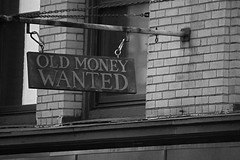How real is money?
 From one perspective, it’s the most real thing in the world. Without it, you don’t eat, you don’t have a place to live, no clothes to wear, etc. unless you’re living out in the wilderness, foraging off the land. Money can be a tremendous amplifier of personal power. With an inexhaustible supply of money, you could solve world hunger, cure disease, and end conflict.
From one perspective, it’s the most real thing in the world. Without it, you don’t eat, you don’t have a place to live, no clothes to wear, etc. unless you’re living out in the wilderness, foraging off the land. Money can be a tremendous amplifier of personal power. With an inexhaustible supply of money, you could solve world hunger, cure disease, and end conflict.
On the other hand, money is entirely fictional. It’s a construct, an artificial intermediary between things we value, because we may not value them equally or at the same time. I may sell email marketing and you may sell search engine optimization. If I don’t need SEO, no matter how valuable your skills are, I won’t trade with you no matter how much you need email marketing. With money, if someone else needs SEO, you can take their money and then give me that money for email marketing.
How fictional is money? The recent stock market mini-crash (due to a trading software error) caused several indexes to lurch as much as 10% below their value in mere seconds. At one point, the Dow Jones Industrial Average was down 998 points. This erased as much as $1.25 trillion dollars of theoretical wealth in mere minutes. Think about that for a second. Think about how much money that would be if you had it in your bank account.
- You could send 5 million students to college for 4 years.
- You could spend a million dollars a day and not run out of money for 3,424 years.
- You could own 1,667 super-giant luxury houses.
- You could pay cash for the entire Iraq/Afghanistan war and still have a couple hundred billion left over in change.
Think about the fact that $1.25 trillion was erased, vaporized, in just minutes. Imagine every student in college right now quitting all at once, or an entire city block vanishing in just minutes. That’s staggering, when you think about it. It’s hard to wrap your brain around.
Now think about the fact that the NASDAQ ordered a nullification of trades between 2:40 PM and 3:00 PM (when the mini-crash happened) for trades exceeding 60% of market value in either direction. Poof! Suddenly a big chunk of that imaginary money that was lost is back again.
You couldn’t build 1,600+ houses in minutes. You couldn’t enroll 5 million students in minutes. You couldn’t wage a 9 year war in minutes. But because of money’s fictional nature, you can make trillions of dollars appear with just a few clicks of a mouse.
What does this all mean for you? Think about your attitudes towards money, towards what you’re chasing. It’s a completely fictional construct that in our society is anchored to faith alone, making it the one true faith-based initiative our government has successfully created. Money is worth only what society believes it to be worth, because we can create or destroy vast quantities of it in minutes. It has no intrinsic value.
More important, if it’s entirely fictional, if it’s anchored only in belief of value, then instead of chasing money, think about how to create the perception of value. Think about how to inspire in someone else the desire to give you anything you want in exchange for that perceived value. What do people value about you, about your products or services? How can you provide more of that value perception? How can you boost the perception of the value that’s already there?
What do you value? I know that as a businessman, I tend to value three big things – things that will save me time, things that will save me money, and things that will make me money. If I perceive that your product or service can do any of those things well, I perceive that it has value and will buy from you.
Change your focus from trying to take other people’s money to creating the perception of value and see if other people start handing you a lot more money.
Did you enjoy this blog post? If so, please subscribe right now!
Get this and other great articles from the source at www.ChristopherSPenn.com! Want to take your conference or event to the next level? Book me to speak and get the same quality information on stage as you do on this blog.



Leave a Reply